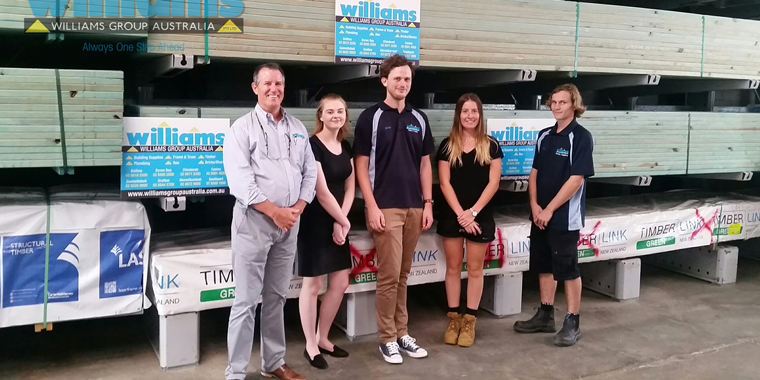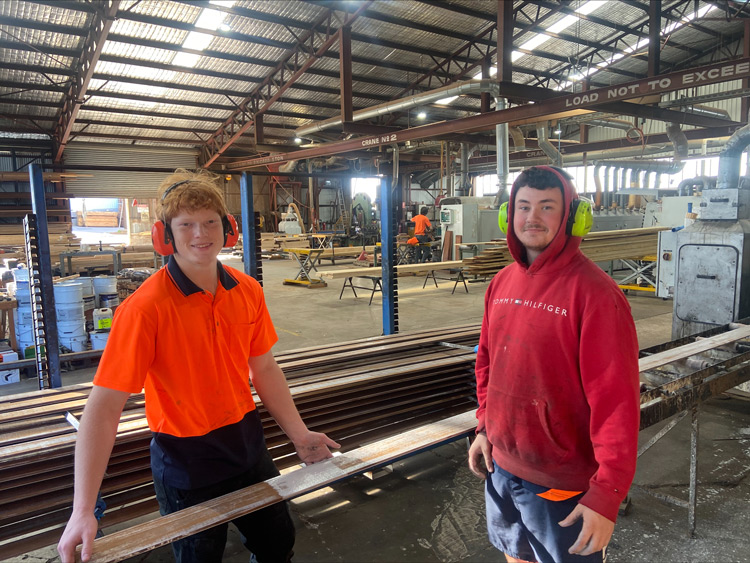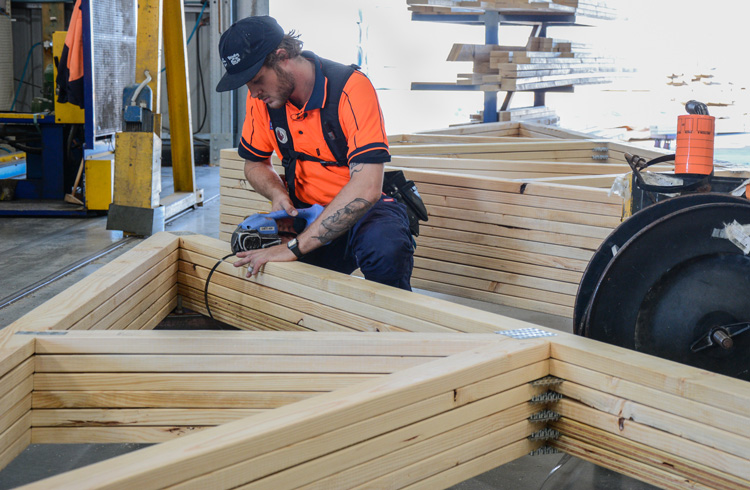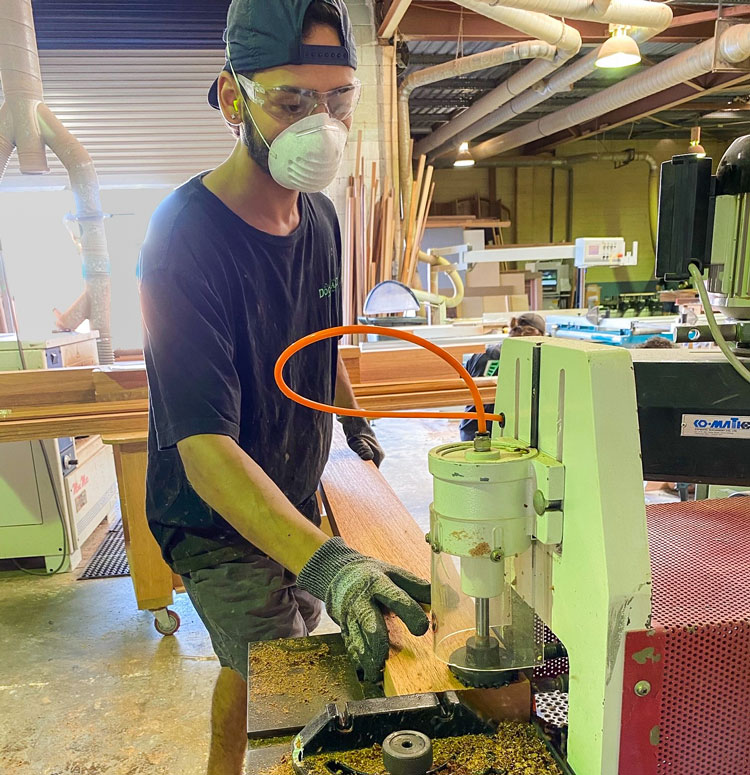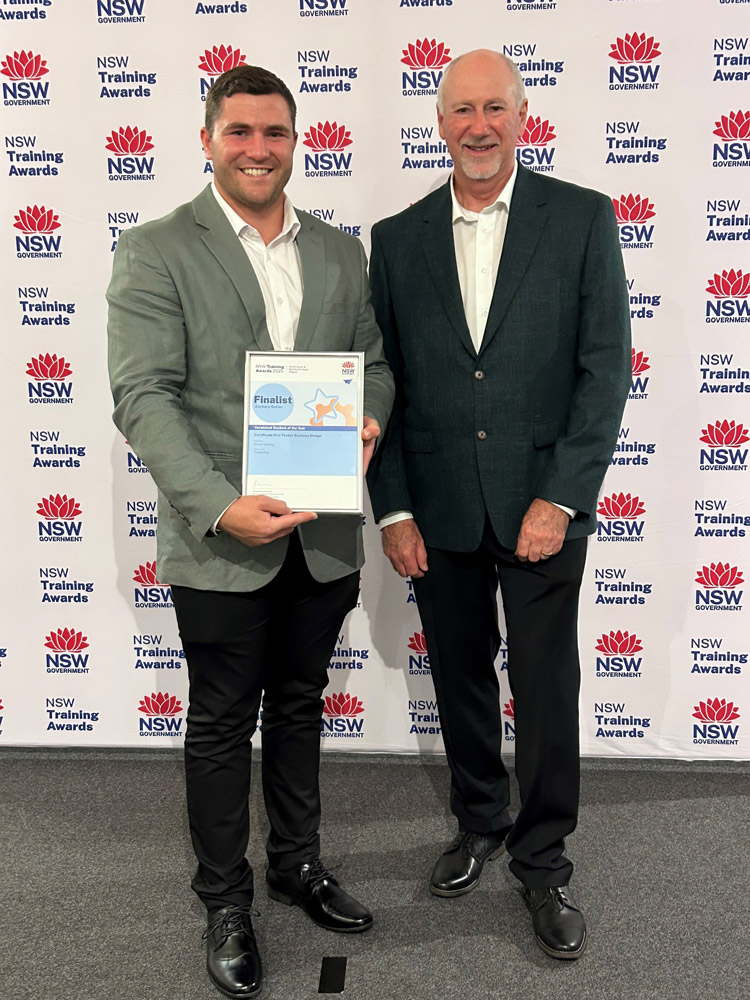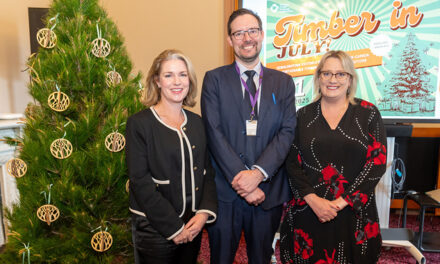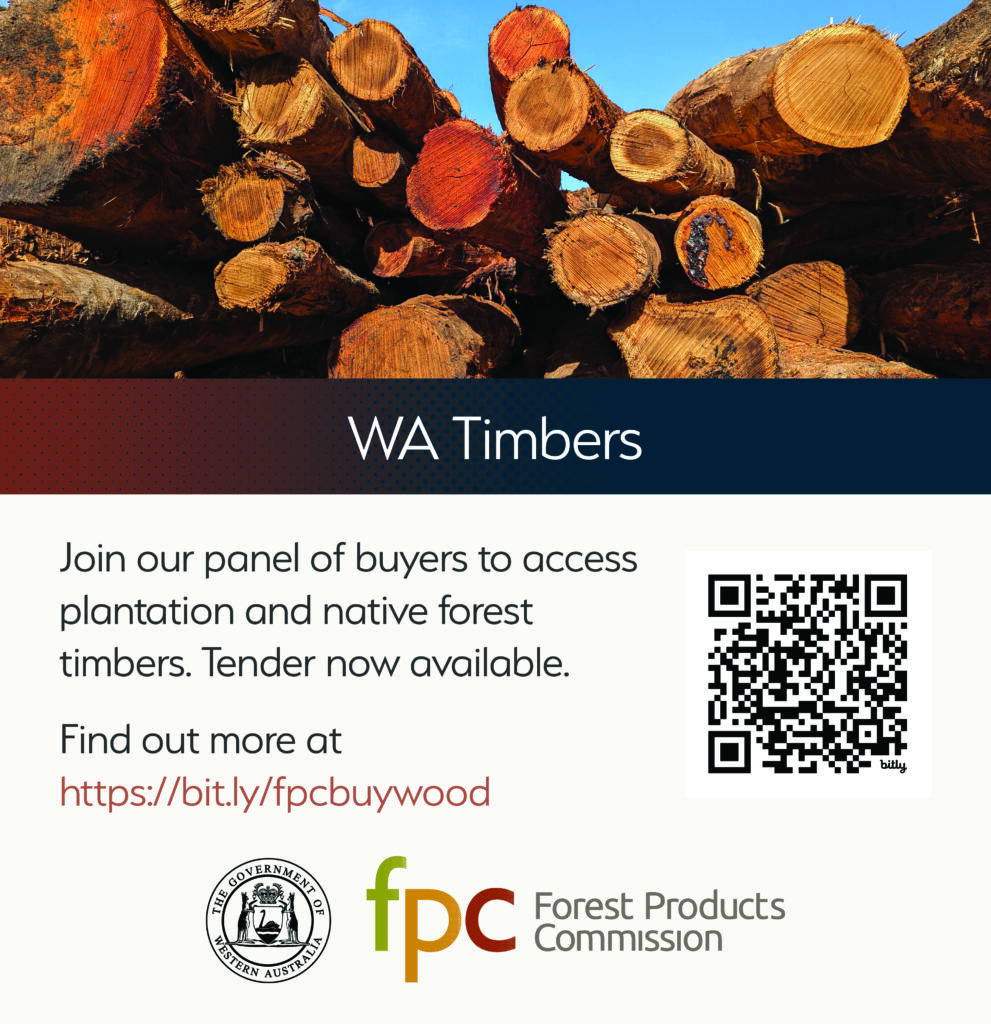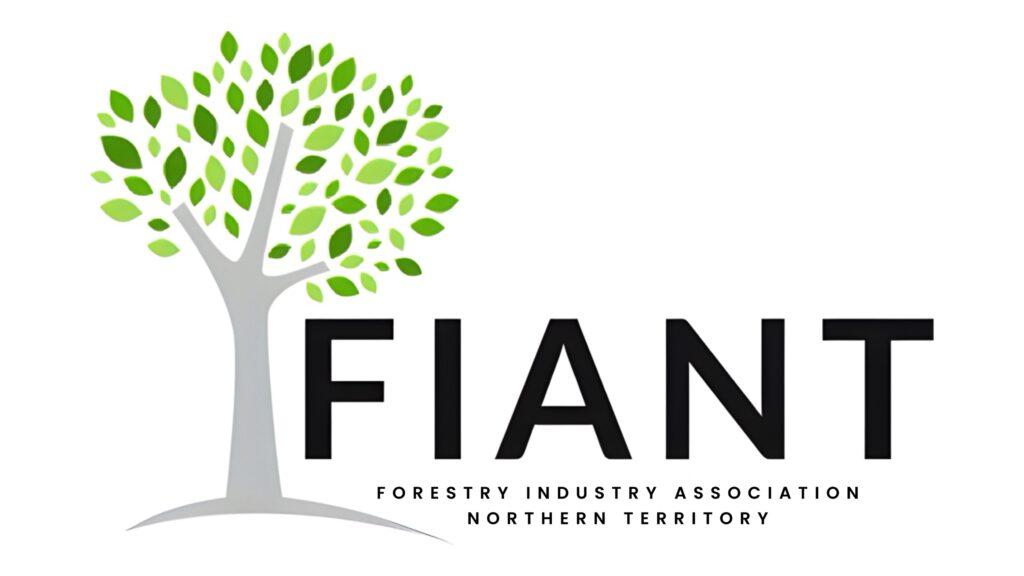One step to trainee success
NTHA’s training programs take the stress out of traineeships and apprenticeships for employers and trainees.
Few students know that many hands-on timber jobs are now performed entirely or mostly indoors.
Many young people don’t know about jobs in frame and truss fabrication. Matt Hojem is building a timber career as an NTHA trainee.
Blake Clayton got his start as an NTHA apprentice at Gold Coast Doorland, where he was an Apprentice of the Year finalist in 2018. All images supplied
Zac Butler completed a Certificate III in Timber Systems Design in just 12 months with the support of NTHA after a career change and was a finalist in this year’s NSW Training Awards.
MAIN PIC: Trainees are an important investment for Williams Group Australia, who find many of their future employees and leaders in the programs. All images supplied
Australia’s workplaces are hungry for skilled staff, but supply isn’t keeping up with demand – especially in industries like timber and hardware. While businesses can choose to find and train apprentices on their own, many are turning to Group Training Organisations (GTOs) like the National Timber and Hardware Association (NTHA) to simplify the process.
“A lot of businesses in the timber sector are small or medium-sized,” says Melissa Clark, General Manager of GTO and RTO services at NTHA. “They often see the barriers to hiring a trainee and wonder if the benefits are worth the effort. That’s where we come in – NTHA takes on the difficult parts of managing trainees and apprentices, making the process far more accessible for those companies.”
We spoke with Melissa about how GTOs operate, how NTHA supports both trainees and host employers, and also two inspiring stories of former apprentices who have built successful careers in the timber industry.
“The feedback we get says there are three main reasons employers use a GTO like NTHA,” Melissa says. “They’re the same for both traineeships and apprenticeships, even though there are differences between the two.
“The first is we handle the whole recruitment and onboarding process; the second is we’re the legal employer of the trainee – so the host company can offload most of the responsibility and risk onto us; and the third is that an organisation like NTHA brings expertise to the relationship in terms of mentoring and support.
“In our case, we also bring decades of experience in the sector, which means we can give focused advice when it comes to finding the best registered training organisation (RTO) and the best host employer fit for our trainees.”
FINDING THE RIGHT FIT
NTHA’s specialist recruiter goes out to schools and community groups looking for would-be trainees and apprentices. “Some of them have already been working in wood at school, while for others it’s the first time they’re hearing about jobs like frame and truss manufacture, wood machining or timber systems design,” says Melissa.
“We’ll look at anyone with an interest in working with their hands, who wants a career path and is reliable. We just make sure they’re prepared to put in the hard yards, because we can train the skills, but we can’t train the behaviour.”
NTHA then enters into a contract with them directly and effectively hires them out to the host companies. As the legal employer, NTHA manages payroll and taxes, covers leave, super and other entitlements, deals with WHS and workers compensation and, if a placement isn’t working out, can intervene to solve the problems or, if needed, find a new trainee and a new host.
While this service comes with a cost, it is less in both monetary terms and in added time than what taking on a trainee or apprentice directly would be for the host company.
“We know all the awards, all the requirements, how to fill out all the forms, so we can do all that admin side far more efficiently,” says Melissa. “I’ve had prospective host employers come to me after having had a go at employing trainees and apprentices directly and they say: ‘I haven’t got time for all that; we’ve got a business to run!’”
With decades of experience (NTHA was formerly known as TABMA), the organisation is deeply connected across the sector, unlike other GTOs. It’s not just the advantage of a familiar name: the team is also familiar with the entirety of the timber industry, so when talking with prospective candidates, they can answer all their questions on different types of jobs, say who’d be best suited to an apprenticeship or traineeship, and help to find the best training organisation, taking into account their work, location and what they need to meet their requirements.
Melissa says, “Young people think carpentry and joinery when you say timber, but they don’t know there’s a huge prefab and F&T sector where you’re working indoors.
“We tell them about computer jobs designing the frames and trusses for a house, and they don’t even know that job exists, let alone that you can be on $100,000 five years after you’ve qualified if you’re good, because it’s a skill shortage, and that some jobs can be done remotely.”
One major advantage of a GTO becomes apparent when problems arise with trainees or apprentices. NTHA has seen placements fail for reasons as basic as an apprentice losing access to their car, while in some cases the match simply isn’t a good fit.
“I’ve found that 95% of the time in those cases, host employers will say ‘that’s okay, we want someone else.’ And we can place another trainee with them,” says Melissa.
Every trainee and apprentice comes with a dedicated NTHA field officer who works with both them and the host company. They are an integral part of the placement’s success.
“That intermediary position means that both parties can trust the field officer has their best interests at heart,” Melissa says. “A trainee might have a question they think is too silly for their supervisor, like how to fill out a timesheet, but they’re happy to ask the field officer to help. Similarly, the employer might ask the field officer – in their mentor role – to be the one to say, ‘so a 7am start means boots on, ready to work, not just rocking up at site.’”
Feedback flows in both directions and the field officers are also in touch with the RTO to keep tabs on progress. In some cases, the work placement is going so well the host company would like to finish an apprenticeship early and offer a job. Thanks to these close relationships, NTHA can reach out to the RTO and see if they can also get the theory side signed off – a task much harder to manage without a GTO.
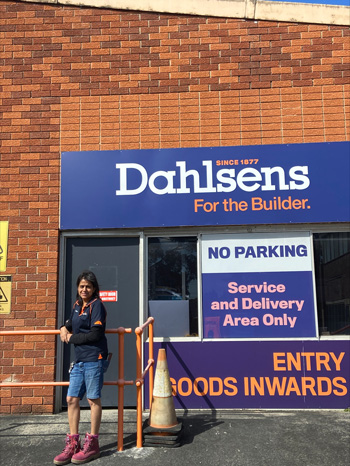 TRAINEE SUCCESS STORY 1
TRAINEE SUCCESS STORY 1
Aiman Merchant, now the successful and respected Branch Manager of Dahlsens in Kirrawee, NSW, began her remarkable career in the timber industry through an NTHA apprenticeship in Timber Retail.
“When I came across the course, I was a single parent looking for a job,” Aiman recalls. “I’d always wanted to be part of the timber industry – my father ran a similar business back in India. I knew it was something I could handle and thrive in.”
Despite finishing her two-year course in just 13 months, Aiman missed out on the first role she applied for, before she met a TABMA/NTHA specialist who went to bat for her.
“He asked me if I was okay working alongside 17-year-old male apprentices,” she laughs. “I said, absolutely – I was just grateful for the opportunity.”
That turned into a hands-on, full-spectrum role where she immersed herself in counter sales, special orders, restocking, and learning the full range of hardware operations. Her versatility soon saw her move into the plumbing section, working across roofing, flashings, and fittings.
In 2021, she took a major step by joining Dahlsens and quickly rose through the ranks. Her apprenticeship taught her vital skills and knowledge, especially about Australian industry standards and timber regulations.
“Every country has different laws. Learning about timber accreditation, species, production methods, all of that fascinated me. But one of the most valuable things I learned was how to truly interact with customers,” Aiman says.
In a male-dominated industry, Aiman has her share of challenges: “You do get customers who look right through you, questioning your knowledge just because you’re a woman. But I’ve got a beautiful team behind me who supports and respects me.”
Aiman now works to uplift other workers, particularly women, mentoring and nurturing new talent. “Our job is not just about selling – customers expect real specialist advice,” she says. “I want to teach the right way from the ground up because this industry needs people with deep knowledge and hands-on experience.”
APPRENTICE OR TRAINEE?
One of the first decisions made in the process is whether a traineeship or apprenticeship is most appropriate. The length or term is the major difference, which has a notable impact. As Melissa says, young people who live at home find it much easier to be on a reduced rate for the four-year apprenticeship, while ‘mature age’ candidates – anyone over 21 – are more likely to take up a two-year traineeship, unless they are looking for a position with a mandated apprenticeship.
“It’s all certificates, but there is usually more flexibility in terms of being able to mix up some courses in a traineeship, while the course of study for an apprenticeship is often fixed,” Melissa adds.
NTHA also runs an RTO – FITEC Australia Pty Ltd, trading as NTHA Training – which delivers nationally recognised vocational qualifications across all sectors of the forest and timber industry.
“Our training organisation is focused on quality training outcomes that lead to career pathways for our learners and a skilled and capable workforce for our customers across Australia,” says Melissa.
“Because we know what timber businesses need, we know how important it is to be adaptable. Say we have someone who is working mostly in a warehouse, but the host employer runs a sawmill on the side. We might be able to add some sawmilling units to their certificate in warehousing operations, adding another string to their bow.”
NTHA is also able to show from experience the worth of the skills trainees and apprentices will learn. “We’ve had people succeed in the timber industry and then go out and take on management roles in other fields, because the skills they learn are so transferable,” says Melissa. “Timber jobs are effectively all customer-facing, and that customer service experience is invaluable in the job market.”
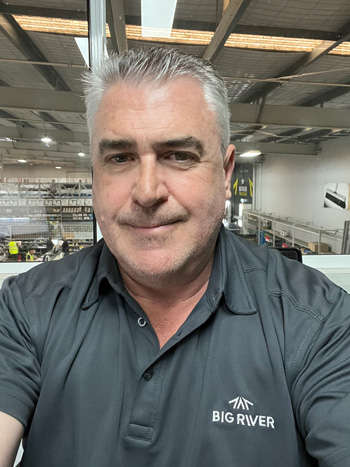 TRAINEE SUCCESS STORY 2:
TRAINEE SUCCESS STORY 2:
A TABMA traineeship gave Stephen Fife the foundation for his successful sales career.
“I started my traineeship back in 1988/89 after I had just finished school and decided to take up a Timber & Building materials/retail traineeship with TABMA. Back in those days I was in one of the first classes that TABMA ever had.”
The program gave Stephen hands-on experience across multiple areas of the timber and building materials business, from grading and estimating to sales.
“We would spend most of our time working in the business we were in, then come down to Sydney once a month and do the theory side of things,” he says.
Stephen finished top of his class and was soon offered a full-time job based on TABMA’s recommendation.
For the next 14 years he had a successful career in timber sales, moving into leadership roles, before taking a 20-year detour from the timber industry.
“I used my skills to run a few businesses of my own across multiple sites. After I sold them, I spent some time finance broking and then I got back into the timber industry with Meyer Timber, and I have loved every minute ever since,” Stephen says.
Now branch manager at Big River’s Albion Park site, Stephen leads a team of over 30 people and contributes to the growth of the business across the region. He is a strong advocate for investing in trainees and sees it as essential to the future of the industry.
“If you invest in your training, it pays off. And it not only pays off for the individuals, it pays off for the industry as well,” he says.
“We have to invest in our staff by training and getting people on who are interested in having lifelong careers, not changing every couple of years. NTHA is a conduit that makes that happen.”

